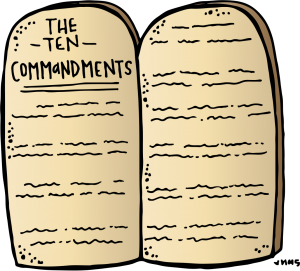 Shortly after Israel’s great deliverance from Egypt, God made a covenant with the nation of Israel that He would be their God and they would be His people.
Shortly after Israel’s great deliverance from Egypt, God made a covenant with the nation of Israel that He would be their God and they would be His people.
You yourselves have seen what I did to the Egyptians, and how I bore you on eagles’ wings, and brought you to Myself. Now then, if you will indeed obey My voice and keep My covenant, then you shall be My own possession among all the peoples, for all the earth is Mine; and you shall be to Me a kingdom of priests and a holy nation. (Exodus 19:4-6)
Notice the if…”if you will indeed obey My voice and keep My covenant…”
Like most covenants, God’s covenant with the nation of Israel had conditions. Covenant conditions may take the form of terms (as in a written contract), vows (as in a marriage) or commandments (as between God and man). The covenant conditions are the basis for the covenant relationship…they define the relationship agreed to in the covenant. If the covenant terms are not kept…if the vows are violated…if the commandments are broken…the covenant is broken…it becomes null and void.
We see an example of this in Jeremiah 3:8 where God said:
And I saw that for all the adulteries of faithless Israel, I had sent her away and given her a writ of divorce, yet her treacherous sister Judah did not fear; but she went and was a harlot also.
The Kingdom of Israel (comprised of the ten northern tribes of Israel) had so egregiously violated God’s commandments for so long that God finally divorced them, legally dissolved the covenant, and allowed them to be conquered and cease to exist as a people group. Today, scholars refer to them as “the ten lost tribes of Israel.”
In God’s covenant with Israel, the covenant terms were The Ten Commandments, which God spelled out immediately after saying He would make a covenant with Israel (Exodus 20:1-17). Later, God wrote The Ten Commandments (the covenant vows) in stone and they were placed inside the Ark of the Covenant.
One of the ancient customs associated with covenants was to write the covenant vows on paper, then roll the paper up in a tiny scroll and place it inside a locket worn as jewelry…similar to a charm worn today on a bracelet, necklace, or headband. Similarly, God instructed Israel to build the Ark of the Covenant in which the stone tablets containing The Ten Commandments were to be placed. The covenant vows were placed inside the covenant box.
What about the New Covenant?
We know Jesus fulfilled the Old Covenant (both the Abrahamic Covenant and the Mosaic Covenant) on our behalf. We now reap the benefits of the old covenant when we enter into covenant with Jesus Christ.
But what are the conditions of the New Covenant?
Jesus clearly spelled them out at His last supper with His disciples.
If you love Me, you will keep My commandments. (John 14:15)
He who has My commandments and keeps them is the one who loves Me; and he who loves Me will be loved by My Father, and I will love him and will disclose Myself to him. (John 14:21)
If you keep My commandments, you will abide in My love; just as I have kept My Father’s commandments and abide in His love. (John 15:10)
Do you see how closely His wording parallels the words God said to Israel? “If you keep My commandments…” The commandments are the covenant terms…the covenant vows…the conditions on which the covenant relationship is based.
So what are the commandments Jesus was referring to? God gave Israel The Ten Commandments as their covenant vows. What are Jesus’ commandments for the New Covenant?
A new commandment I give to you, that you love one another, even as I have loved you, that you also love one another. By this all men will know that you are My disciples, if you have love for one another. (John 13:34-35)
This is My commandment, that you love one another, just as I have loved you. Greater love has no one than this, that one lay down his life for his friends. (John 15:12-13)
Remember, this was the same meal at which Jesus enacted the New Covenant. It was also a Passover Meal…the remembrance meal of the Old Covenant…an annual renewal of Israel’s covenant with God. In the last supper, Jesus simultaneously fulfilled the Old Covenant and enacted the New Covenant.
And when He had taken some bread and given thanks, He broke it and gave it to them, saying, “This is My body which is given for you; do this in remembrance of Me.” And in the same way He took the cup after they had eaten, saying, “This cup which is poured out for you is the new covenant in My blood.” (Luke 22:19-20)
At the same covenant meal, Jesus both declared the New Covenant and declared the covenant terms…a new commandment to accompany the new covenant.
A new commandment I give to you, that you love one another, even as I have loved you, that you also love one another.
Jesus had previously explained very clearly the difference between those with whom He is in covenant and those with whom He is not in covenant…those whom He knows and those whom He “never knew”…those who keep His commandment and those who do not.
“But when the Son of Man comes in His glory, and all the angels with Him, then He will sit on His glorious throne. All the nations will be gathered before Him; and He will separate them from one another, as the shepherd separates the sheep from the goats; and He will put the sheep on His right, and the goats on the left.
“Then the King will say to those on His right, ‘Come, you who are blessed of My Father, inherit the kingdom prepared for you from the foundation of the world. For I was hungry, and you gave Me something to eat; I was thirsty, and you gave Me something to drink; I was a stranger, and you invited Me in; naked, and you clothed Me; I was sick, and you visited Me; I was in prison, and you came to Me.’ Then the righteous will answer Him, ‘Lord, when did we see You hungry, and feed You, or thirsty, and give You something to drink? And when did we see You a stranger, and invite You in, or naked, and clothe You? When did we see You sick, or in prison, and come to You?’ The King will answer and say to them, ‘Truly I say to you, to the extent that you did it to one of these brothers of Mine, even the least of them, you did it to Me.’
“Then He will also say to those on His left, ‘Depart from Me, accursed ones, into the eternal fire which has been prepared for the devil and his angels; for I was hungry, and you gave Me nothing to eat; I was thirsty, and you gave Me nothing to drink; I was a stranger, and you did not invite Me in; naked, and you did not clothe Me; sick, and in prison, and you did not visit Me.’ Then they themselves also will answer, ‘Lord, when did we see You hungry, or thirsty, or a stranger, or naked, or sick, or in prison, and did not take care of You?’ Then He will answer them, ‘Truly I say to you, to the extent that you did not do it to one of the least of these, you did not do it to Me.’ These will go away into eternal punishment, but the righteous into eternal life.” (Matthew 25: 31-46)
Israel had ten commandments…ten covenant vows. We have one…love one another as Christ has loved us.
God carved the commandments of the Old Covenant on stone tablets to be placed inside the Ark of the covenant. Where is the commandment of the New Covenant written and kept?
“But this is the covenant which I will make with the house of Israel after those days,” declares the Lord, “I will put My law within them and on their heart I will write it; and I will be their God, and they shall be My people. (Jeremiah 31:33)
The one who keeps His commandments abides in Him, and He in him. We know by this that He abides in us, by the Spirit whom He has given us. (1 John 3:24)
Now He who establishes us with you in Christ and anointed us is God, who also sealed us and gave us the Spirit in our hearts as a pledge. (2 Corinthians 1:21-22)
The terms of our covenant with Christ…our New Commandment…the covenant vow of the New Covenant…is written in our hearts and sealed with the Holy Spirit who transforms us to His image, enabling us to keep our covenant vow. He gave us the commandment…and He gives us a new heart so we can keep the commandment.
The New Covenant is not, as many claim, an unconditional covenant. It is very much a conditional covenant and the conditions are clearly spelled out. However, it is a covenant in which our covenant partner enables us to keep the vows through His transforming power.
What a wonderful Savior!
Your thoughts?

